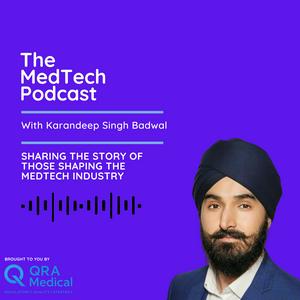Dr. Amel Havkic, founder of EvoMed Consulting and a lung and critical care specialist, hospital clinical lead. Amel works at the intersection of bedside medicine and MedTech strategy, helping innovators build clinician-approved solutions that scale safely across real healthcare systems.
In this episode, we unpack why “clinicians love it” is rarely enough to win adoption, and what hospital purchasing actually looks like when procurement, IT, finance, compliance and workflows all have a seat at the table. Amel breaks down why switching away from legacy tools is painful, how integrations can break care pathways, and why solutions that feel like a natural part of the hospital ecosystem win faster. He also shares a practical lens for building frictionless implementation by aligning with standards like HL7, FHIR and DICOM, while proving measurable value for patients and payers.
We also go deep on decentralising healthcare. Amel explains how the Dutch model centralises high-end expertise while decentralising access through remote monitoring and home-based onboarding, and why this becomes a winning approach as staffing pressures rise. On AI, he makes the case for reframing it as augmented intelligence, not autonomy, and shows where decision support can raise the baseline of care by supporting clinicians in time-critical situations, as well as offloading admin burden that drains capacity.
Finally, Amel shares the thinking behind the EMC StarMap framework, a navigation tool built from real-world patterns of what makes MedTech succeed or fail. His core message is simple: regulatory approval is a milestone, but clinical adoption is the real finish line.
Timestamps
[00:00:05] Clinician + Consultant Lens: Seeing Adoption and Safety Risks
[00:01:22] Why “Physicians Love It” Does Not Mean Hospitals Will Buy
[00:03:27] What Hospitals Consider Beyond Cost: Workflow, Integration and Training
[00:05:09] Frictionless Implementation: Standards, EHR Fit and “Team Player” Products
[00:06:24] Real Clinical Workflow: ICU Reality and Why UI Clicks Matter
[00:07:31] Decentralising Care: Centralised Expertise With Home-Based Delivery
[00:10:37] AI in Healthcare: Reframing as Augmented Intelligence
[00:12:55] Staffing Shortages: Where AI Can Remove Waste and Scale Expertise
[00:14:38] If You Could Change One Thing: Put the Patient Back at the Center
[00:16:59] StarMap: Measuring What Drives Clinical Adoption
Connect with Rick - https://www.linkedin.com/in/a-havkic/
Learn more about Evomed Consulting - https://evomed-consulting.eu/
Get in touch with Karandeep Badwal - https://www.linkedin.com/in/karandeepbadwal/
Follow Karandeep on YouTube - https://www.youtube.com/@KarandeepBadwal
Subscribe to the Podcast


